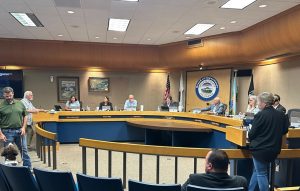The Imperial County Board of Supervisors approved a series of significant actions to support agriculture, youth employment, community infrastructure, and public health at their regular meeting on July 22.
The Board approved the Fiscal Year 2025-26 budget and assessment plan for Imperial County Citrus Pest Control District #1. The $450,000 budget will be funded through assessments on citrus orchards, based on acreage, as authorized under the California Food and Agriculture Code. The District had previously held a public hearing on May 21, 2025, with no written or oral objections received. The approved budget includes funding for pest mitigation activities such as biocontrol, canine detection, nuisance abatement, and grower complaint reimbursements. Administrative expenses such as salaries, insurance, accounting, and vehicle maintenance were also factored into the financial plan.
According to the Agricultural Commissioner’s office, this funding will help prevent and control the spread of invasive citrus pests that pose a risk to the region’s agricultural economy. With 5,500 acres of citrus under its purview, the District’s continued vigilance is critical to protecting crop yields and maintaining market access.
The Board also approved a one-year renewal agreement with Arbor E&T, LLC, operating as Equus Workforce Solutions, to provide youth workforce services under the Workforce Innovation and Opportunity Act (WIOA). The renewed contract totals $1,114,034 and will run from July 1, 2025, through June 30, 2026. Under the agreement, Equus will provide employment and training services to approximately 165 WIOA-eligible youth aged 14 and 24 across Imperial County.
This follows a previous one-year agreement approved in 2024 valued at $1.39 million, during which Equus served 215 youth across communities including Calexico, El Centro, Holtville, Heber, Ocotillo, Brawley, and Winterhaven. The organization will continue its focus on historically underserved areas such as Calipatria, Niland, and the Salton Sea region—communities often challenged by limited access to services, high unemployment, and environmental stressors.
Equus targets high-need populations, including justice-involved youth, youth with disabilities, English language learners, parenting and foster youth, those experiencing homelessness, and individuals facing mental health or substance use challenges. Through job placement assistance, mentorship, skills training, and career counseling, the program is designed to help youth transition into post-secondary education and meaningful employment.
In a significant step toward improving local infrastructure, the Board adopted the plans and specifications for the Heber Townsite Improvements – Phase II, County Project No. 7135CAPP, and authorized the project to go out for public bidding. The $3.24 million project will include infill street paving, sidewalks, ADA-compliant pedestrian ramps, cross gutters, striping, signage, and erosion control improvements. All construction will occur within the county road right-of-way, by state public contracting procedures and county codes.
The project will be funded through a combination of $2.43 million from the Imperial County Air Pollution Control District’s AB 617 Community Emission Reduction Program and a local match of $808,471.56 from Local Transportation Authority (LTA) funds. The improvements are expected to enhance pedestrian safety, traffic flow, and accessibility in the Heber area—a growing unincorporated community with ongoing infrastructure needs.
In another public health initiative, the Board authorized the Imperial County Air Pollution Control District and the Public Health Department to enter into a three-year funding agreement for the launch of the Asthma Smart Management Awareness (ASMA) Program. The program will be funded in an amount not to exceed $1,186,183 through the California Air Resources Board’s Community Air Protection Program, as part of the broader goals of Assembly Bill 617 to reduce air pollution and improve health outcomes in disproportionately affected communities.
The ASMA Program aims to educate residents on asthma prevention and management, increase awareness of environmental asthma triggers, and improve access to resources that help families manage the condition. The Public Health Department will be responsible for implementation and reporting, with activities including community outreach, educational workshops, and partnerships with healthcare providers. ICAPCD believes this initiative will provide measurable health and air quality benefits for a significant portion of the county population, particularly in areas where asthma rates are high due to environmental and socioeconomic factors.



